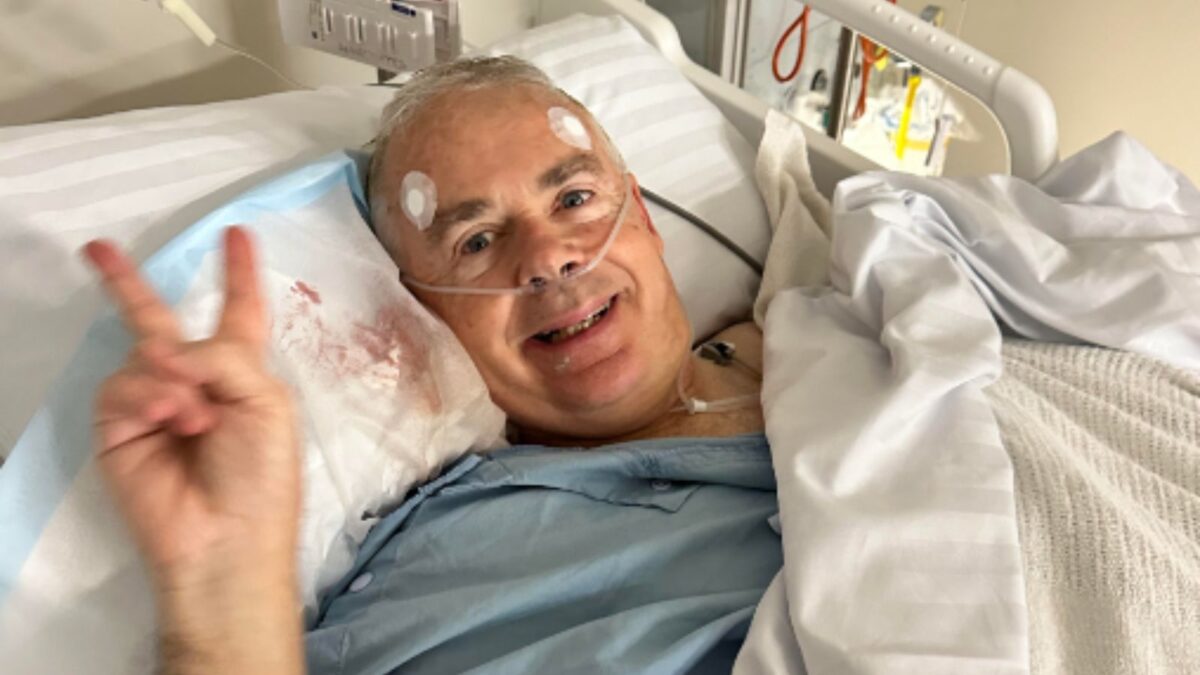100,000 best wishes for Graham Hand
The news on Firstlinks this Thursday morning was personal. Graham Hand opened up to his 100,000-or-so readers about the tumour discovered in his brain. He didn’t bury the lead, either. The story was accompanied by his hospital photo.
Within the first hour of publication there were 68 comments on the page. This number has since more than doubled, which should please Graham not just because he will recognise many of the names and the heartfelt sentiments of the commentators, but because their comments will also drive more clicks. Such is the nature of internet publishing.
The response provides more, but probably unnecessary, evidence of the incredible, and dare I say (again) unlikely success of Graham’s foray into the world of specialist industry publications. His first newsletter was published on February 8, 2013. This is how ISN broke the news on January 27:
Chris Cuffe, the UniSuper chair and former Colonial First State boss, is about to get into publishing with the launch of a weekly newsletter for investment and superannuation, called Cuffelinks. Cuffe is joined by three other “grey-haired colleagues” who believe the industry is lacking sufficient independent quality writing about issues, at the same time defending the merits of superannuation.
The others are Graham Hand, who is editor, David Bell, an academic, and Rick Cosier, a financial planner. Hand, a former deputy treasurer of the old State Bank (which grew into Colonial through various mergers) is the author of Naked Among Cannibals, a book about the banks and how they lost the trust of their customer base. He also wrote a general fiction book, Beyond Lucas Heights. The newsletter will be free and carry no advertising, or, as Hand put it: “We have no revenue in our business model.”
I predicted privately to Graham that he would only last two or three years. He would end up doing the bulk of the work himself and get sick of not being paid for it. I thought he would go back to writing books or, heaven forbid, the finance world.
I was right about two of those things. He did most of the work and got sick of it. Next came the unlikely bit.
Cuffelinks developed a solid readership of several thousand mainly industry participants. The content was good – even competitors had to admit that. It would have been sufficient to carry some industry advertising but probably insufficient to grow it into the future, at least as a standalone publication.
So, rather than pack it in, Graham decided to grow the individual reader base of what he calls “informed investors” as well as open the door to sponsorship from funds management contributors. Both strategies proved successful.
A year after launch, Cuffelinks opened its door to sponsorships. The initial group consisted of FINSIA, Research Affiliates, Magellan Asset Management and the SMSF administrator SuperIQ. The funds allowed Graham to recruit staff, improve the quality and breadth of the title and grow its reach. Today there are 25 contracted sponsors.
Graham subsequently took full ownership of Cuffelinks and changed its name to Firstlinks, selling it to Morningstar in October 2019. Chris Cuffe said at the time: “The new name, Firstlinks, retained the ‘links’ to the previous name, and recognised the content as the ‘first link’ between our readers and the ideas. There was a connection with the charitable business I manage, Third Link, and the time when Graham and I worked together at First State.”
In his “special note to readers” with Firstlinks Issue 534, Graham provided the sort of detail about his condition that readers have come to expect from his writing.
“I underwent a biopsy and exploratory surgery last week to diagnose the type of cancer, confirming glioma, which can grow quickly and destroy healthy brain cells, but with variable outcomes. Further scans showed the cancer has not spread to other parts of my body. The treatment is expected to rely on radiation targeted directly at the tumour over an initial programme of six weeks, depending on the oncology judgement and doses, supplemented by chemo.
“I am 65 and I expected to live a long life, writing productively for maybe another 25 years. I am rarely sick, take no medications, drink little, never smoke, eat well. I write about superannuation and longevity and independence in a long retirement and assumed this was my future. Now, it seems unlikely.”
He added that he would fight the cancer with the best medical care in Australia. “I have accepted the outcome, whatever it is, and I am not thinking ‘why me?’ because life takes many turns. I’ve had a fortunate life and a wonderful family living in this great city and country.”
Gotta hand it to Graham.











